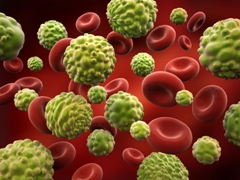04 February 2014
 As today marks World Cancer Day, latest research from South Australia’s Centre for Cancer Biology (CCB) may provide new insight into the understanding and treatment of cancer.
As today marks World Cancer Day, latest research from South Australia’s Centre for Cancer Biology (CCB) may provide new insight into the understanding and treatment of cancer.
Published in high profile international scientific journal Nature Communications, the research from CCB co-director Professor Sharad Kumar and his team, including lead author research fellow Dr Donna Denton, looks at how a gene called UTX plays an important role in controlling cell death.
This is significant because the spread of cancer from one organ to other parts of the body relies on cancer cells’ ability to evade the cell death process.
The CCB is an alliance between the University of South Australia and SA Pathology and boasts the largest concentration of fundamental cancer research in the state.
This latest CCB research, funded by the National Health and Medical Research Council, specifically looked at how UTX plays a role in controlling cell death by regulating the expression of a number of other genes.
For more than 20 years Prof Kumar has been investigating the processes by which cells undergo death and the molecular machinery that determines whether a cell lives or dies.
Prof Kumar says cell death is essential to maintain the correct number of cells in the body and to get rid of cells that have been damaged and become potentially harmful. His laboratory uses animal models including the vinegar fly Drosophila to study how various genes control the process of cell death and how they determine which cells are specifically deleted during development.
“Cell death and survival are controlled by many genes, and defects in these genes are often linked to diseases. For example, the inability of cells to evade cell death is a well-known hallmark of cancer,” Prof Kumar says.
“The vinegar fly has proved to be an excellent model to study cell death during development given its genetics are well understood; it is experimentally highly amenable and more than 60 per cent of human disease genes are conserved in the fly,” Dr Denton says.
In the current study they identified that UTX, an ‘epigenetic modifier’, is necessary to maintain high levels of expression of a number of genes that are required for deleting a specific tissue at a precise time during the development of the fly.
“Interestingly, a similar human gene is often mutated in many cancer types,” Dr Denton says.
“The work also indicates that UTX cooperates with a steroid hormone receptor to carry out its gene regulation function.
“Steroid hormones are important in many human cancers, including breast and prostate cancer.
“Therefore our work may provide new insight into the understanding and treatment of cancer.”
Contact for interview: Dr Donna Denton office 8222 3158 mobile 0403 881 513
Media contact: Kelly Stone office 8302 0963 mobile 0417 861 832 email Kelly.stone@unisa.edu.au



